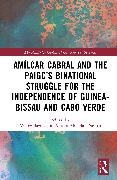En savoir plus
The struggle for independence of Guinea-Bissau and Cabo Verde was shaped by a multiplicity of interactions and connections. Because of the intimate association between the African Party for the Independence of Guinea and Cabo Verde (PAIGC) and Amílcar Cabral's leadership, the existing scholarship has been discussing the fight led by the liberation movement and its Secretary-General's role within a single analytical framework.
While much has been written, most studies fail to break the many historiographical silences still existing around the subject.
Amílcar Cabral and the PAIGC's Binational Struggle for Independence of Guinea-Bissau and Cabo Verde intends to evince a multiplicity of analytical itineraries through which Cabral's figure can contribute to understand the rise to statehood of both territories and the construction of memory of the anti-colonial struggle.
Table des matières
IntroductionAmílcar Cabral and the PAIGC's Binational Struggle for the Independence of Guinea-Bissau and Cabo Verde - Víctor Barros and Aurora Almada e Santos
Anticolonial ThoughtChapter 1Placing the West Before a Tribunal: Strategies of Critique in African Anticolonial Discourse - Branwen Gruffydd Jones
Chapter 2Amílcar Cabral, the Just War, and the Right of Oppressed Peoples to Solidarity and Happiness - Julião Soares Sousa
Current ReadingsChapter 3Amílcar Cabral as an Engaged and Dialectical Political Ecologist: Relating Land, Production and Circulation, 1946-1961 - Aharon deGrassi
Chapter 4On Amílcar Cabral's Humanism - Olúf¿¿mi Táíwò
Networks of SolidarityChapter 5Non-Governmental Organisations Support for Amílcar Cabral and the PAIGC in the United States - Zachary C. Peterson
Chapter 6Splendour and Fall of a Revolutionary: Amílcar Cabral and the Italian Reception of his Thinking in the 1960s and 1970s - Vincenzo Russo
Chapter 7The United Nations Visiting Missions to Guinea and Cabo Verde: 1972 and 1975 - Aurora Almada e Santos
Postcolonial Memory and LegaciesChapter 8Amílcar Cabral: Memory and Legacy in the Language Policy of Guinea-Bissau's Education System - Rui da Silva, Miguel Filipe Silva and Rui Jorge Semedo
Chapter 9Amílcar Cabral: An African Leader Forged by Propaganda Films - Paulo Cunha and Catarina Laranjeiro
Chapter 10Commemorating Amílcar Cabral as a Nation's Founding Father and a Global Revolutionary: Binational Memory, Local Designs, Transnational Dimensions - Víctor Barros
A propos de l'auteur
Víctor Barros - Researcher at the Institute of Contemporary History (IHC) and the Associate Laboratory for Research and Innovation in Heritage, Arts, Sustainability and Territory (IN2PAST) of NOVA University of Lisbon. His main research interest is Portuguese decolonization and the construction of memory of the Portuguese empire in the former colonies in Africa.
Aurora Almada e Santos - Researcher at the Institute of Contemporary History (IHC) and the Associate Laboratory for Research and Innovation in Heritage, Arts, Sustainability and Territory (IN2PAST) of NOVA University of Lisbon. Her main research interest is Portuguese decolonization, namely the transnational dimension of the struggle for the independence of the Portuguese African colonies.

